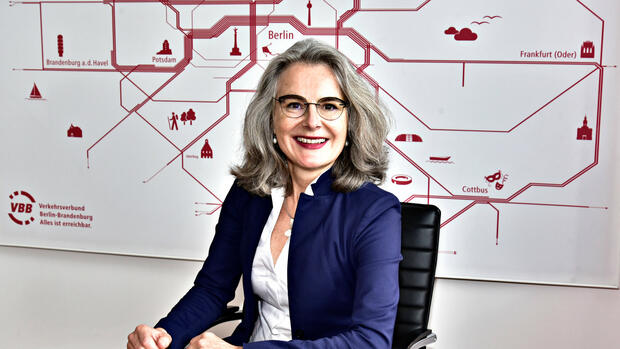Berlin. She is pursuing a “mission impossible,” say some. Others speak of a “wind of change” that Susanne Henckel brings to the complicated relationship between Deutsche Bahn AG and the federal government.
The State Secretary of Federal Transport Minister Volker Wissing (FDP) has had a clear mandate for a good year: she is to bring the ailing railway into shape and set up the federal company in such a way that in future it will run the rail network “for the common good”. The infrastructure divisions are to merge; whose profits no longer flow into the group coffers. From 2024, all of this should work under the umbrella of the joint stock company – including effective control by the federal government.
In view of the experience that the federal government has had with the railways since privatization in 1994, the project seems more than ambitious. The train runs more unpunctual than ever, freight trains are canceled in rows. The network is ailing, which causes chaos in the timetable. The system is a long way from the climate rescuer, who transports twice as many people and two-thirds more goods than before.
The state of the rail network is the result of a failed relationship in which both sides blamed each other for failure instead of working together to succeed. Henckel should create a “we feeling”. The first contours of their concept are emerging.
Perhaps the 58-year-old helps that she lives in a blended family: her partner brought three children and she brought her daughter into the new life together. The relationship between the ministry and the railways is similar: many people involved from different areas have to think differently. Henckel’s advertisement reads: “Together we want to achieve the best for rail.”
Industry knowledge and a dose of optimism help
The Iserlohn native certainly helps that she knows the industry: Even as a young engineer, she presented her vision of modern train stations to the controller of what was then the Federal Railways.
The state secretary of Federal Transport Minister Volker Wissing (FDP) has had a clear mandate for over a year.
(Photo: dpa)
For many years she headed the transport association in northern Hesse and Berlin-Brandenburg and was head of the Federal Association of Local Rail Transport. For the traffic and urban planner, it was always about balancing interests – especially with Bahn AG.
Henckel is considered courageous in the industry and maintains her own women’s network. But she encounters resistance in her own house of all places: for too many years, the railway officials have been watching from the outside and feel like the losers in a game of rabbits and hedgehogs.
“We want to strengthen the federal government’s control options,” says Henckel confidently. “The know-how about the network lies with the railways. Here we have to build up more of our own know-how in-house and create a digital twin for effective control.”
Knowledge and control are one thing. “It is important that everyone involved treats each other as partners,” says the non-party. She recently visited her colleague in Switzerland to have this explained to her as part of the railway country’s recipe for success.
The message from the head of office: The framework for the rail network operator must be so clear that he can do no other than ensure a good network with as much traffic as possible. Whether Henckel will succeed in cultural change by law?
>> Read here: Wissing needs more money for the renovation of the infrastructure
At least there is praise from the railways: “We have already moved more in the last six months than in the last 15 years,” says the chief representative Jörg Sandvoß. He could hardly believe that the coalition had agreed in principle to make the additional 45 billion that Deutsche Bahn deemed necessary available – by 2027 alone. Even if the householders have the last word: “The federal government finances the expenses and not just investments,” says Infrastructure Board member Berthold Huber, pleased about the resolved paradigm shift.
After January 1, 2024, the work will only start
The railway workers’ union EVG is also pleased that nothing will change in the structure of the two infrastructure sectors. Only the board of directors and the supervisory board become one.
The competitors, however, insist on at least an advisory board that they can use to make decisions about investments. The freight railways are still waiting for their talks with the state secretary. They are no longer demanding that the network be separated from the railway company. “We have to close the door on January 1, 2024,” warns Bahn Infrastructure Board Member Huber in view of the discussion.
By then, the company with the working title: “InfraGo” should be founded. But only then does the work begin: Infra-Go has to organize itself in such a way that it can refurbish the network quickly and not just announce “high-performance corridors” and “train stations of the future”. The federal government must provide sufficient money and clarify how it finally controls.
“It’s not enough just to change the group structure,” says Henckel. Rail lobbyist Sandvoß is already preventing false conclusions: “We will remain a commercial enterprise.”
For the common good does not mean non-profit. However, Deutsche Bahn will no longer align its goals with “achieving a high return on capital”. The focus is on quantity and quality, as well as the “appearance, so that it’s fun to ride the train”.
>> Read here: Railway reform: “We want to change as little as possible”
Henckel wants to change the rules of the game so that “the best possible effect for the money” is created. “There is a lot of music in the guidelines for the new society. We want to play a well-sounding piece.”
More: FDP and Greens agree on Tempo 30 zones – and much more
